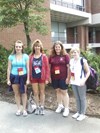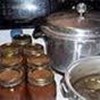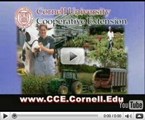Posted 7/6/2010
by Karen Kosinski via NY EDEN

Listen to local news or NOAA Weather Radio for emergency updates.Watch for signs of a storm, like darkening skies, lightning flashes or increasing wind. Postpone outdoor activities if thunderstorms are likely to occur. Many people struck by lightning are not in the area where rain is occurring. If a severe thunderstormwarning is issued, take shelter in a substantial building or in a vehicle with the windows closed. Get out of mobile homes that can blowover in highwinds.
If you can hear thunder, you are close enough to be in danger from lightening. If thunder roars, go indoors! The National Weather Service recommends staying inside for at least 30 minutes after the last thunder clap.
Avoid electrical equipment and telephones. Use batter-powered TVs and radios instead.
Shutter windowsa and close outside dorrs securely. Keep away from windows.
Do not take a bath, shower or use plumbing.
If you are driving, try to safely exit the roadway and park. Stay in the vehicle and turn on the emergency flashers until the heavy rain ends. Avoid touching metal or other surfaces that conduct electricity in and outside the vehicle. If you are outside and connot reach a safe building, svoid high groung, water, tall, isolated trees, and metal objects such as fences or bleachers. Picnic shelters, dugouts, and sheds are NOT safe.
http://emergencypreparedness.cce.cornell.edu
Posted 6/30/2010
by Craig Clark

Marybeth Allen totes a log back to her dorm room at Cornell University Tuesday. Allen along with two other local teens are participating in 4-H Career Exploration. During Marybeth's program, Exploring the Small Farm Dream, teens planted mushrooms inside log sections. If properly cared for these logs next year will sprout edible mushrooms. “I'm sure the mushrooms will be worth it”, she said.
Posted 6/29/2010
by Craig Clark

Delegates at the 2010 4-H Career Explorations Program at Cornell University are 540 strong this year. Youth and chaperones gathered together as organizers divided them into course tracks. Delegates from Fulton and Montgomery Counties include Marybeth Allen, Abigail Andrews and Victoria Guisti with chaperones Craig Clark and Laurie Guisti.
Posted 6/29/2010
by Craig Clark

Delegates to the 2010 4-H Career Explorations Program at Cornell University arrived on campus all ready to participate in a myriad of learning activities! Delegation staff chaperone Craig Clark shared this photo.
Posted 6/25/2010
by Karen Kosinski

Congratulations and Best Wishes to the 18 4-H members who are graduating from area high schools this week. The family of Cornell Cooperative Extension in Fulton and Montgomery Counties wish you success on your adventure through life. We hope that you are taking with you some valuable skills and lessons learned through project and club work in 4-H. We also congratulate all of the graduating seniors who are former 4-H members, but not currently members this year.
Congratulations to 2009-2010 4-H Member High School Graduates: Brittany Arnold, Angela Banick, Karissa Belden, Ian Chapin, Loren Conbeer, Kenneth DeBlock III, Matthew Gogis, Brittany Hotaling, Krystle Hutchison, Sarah Johnson, Cody Knowlton, Rolland Krohn, Aaron Milonovich, Catherine Opalka, Sara Orlowski, Jacob Pamkowski, Courtney Shaver, and Shelby Taylor.
Posted 6/24/2010
by Ellen Abend

Yesterday, some of New York’s residents experienced a relatively rare event – tremors from a 5.0 magnitude (Richter scale) earthquake whose epicenter was located about 35 miles north of Ottawa, Canada. The last notable earthquake in New York State was in 2002. Here are some resources about earthquakes:
FEMA Earthquake website (http://www.fema.gov/hazard/earthquake/)
Fast Facts about earthquakes (http://www.fema.gov/hazard/earthquake/facts.shtm)
Information for Individuals and Families (http://www.fema.gov/plan/prevent/earthquake/info_homeowners.shtm)
What to do during an earthquake (http://www.fema.gov/hazard/earthquake/eq_during.shtm)
What to do after an earthquake (http://www.fema.gov/hazard/earthquake/eq_after.shtm)
Also, here is a website to help children learn about and understand earthquakes. http://earthquake.usgs.gov/learn/kids/
Posted 6/23/2010
by Karen Kosinski

Space remains open for the food preservation class “Pressure Canning of Low-Acid Foods” on Tuesday, June 29th, 6:00-8:00 p.m. The class, presented by Cornell Cooperative Extension in Fulton and Montgomery Counties, will be a combination of instruction, demonstration and hands-on practice. The cost is $15 per person.
Canning can be an economical way to preserve food at home, but it is important to know and use the latest research-based information and practices. Use of home preservation recipes prior to 1994 is not recommended. New research has caused some important changes in practice. This class is geared for those who would like to learn how to can low-acid foods, canners who want to be sure they are using the latest pressure canning recommendations, and those who wish to have a refresher course in pressure canning.
A pressure canner is the only safe method of canning all common vegetables (except tomatoes), meats, fish and poultry. Pressure is necessary to produce the high temperature that kills the bacteria that may cause botulism, a deadly form of food poisoning, which can grow on low-acid foods.
Space is limited. Call 518-762-3909 x 101 immediately to get into the class.
Posted 6/22/2010
by Linda E. Wegner

Come out to Shuttleworth Park in Amsterdam on Saturday, July 10th, 7:05 p.m. to watch the Amsterdam Mohawks play the Cooperstown Hawkeyes and show your supprt for 4-H in Fulton & Montgomery Counties!
-
Promote 4-H – Wear your 4-H t-shirt or your green t-shirt and 4-H accessories!
-
Meet 4-H members, alumni, volunteers and their families from local communities!
-
Meet some 4-H Heroes who will receive special recognition during the game!
-
Stop by the 4-H display table to get your 4-H pin and put in your entry for a drawing of 4-H goodies!
-
Join other 4-H fans ON THE FIELD between innings to recite the 4-H pledge!
-
Say "Hello" to Chris Clover, the 4-H mascot! (Maybe even take your photo with Chris!)
-
Fill out your admission ticket to win prizes at the game!
-
Enjoy a night of great baseball with your friends and the 4-H family!
Get your tickets from 4-H staff at Cornell Cooperative Extension, 55 East Main Street, 2nd Floor #210, Johnstown. General admission tickets at a special price: adults $3 and youth (up to age 19) just $1. For more information call 518-762-3909 x 114.
Posted 6/14/2010
by Anne Ju for the Cornell News
A compound found in sunless tanning spray may help to heal wounds following surgery, according to a study by Cornell biomedical engineers and plastic surgeons at NewYork-Presbyterian Hospital/Weill Cornell Medical Center.
Results published online May 31 in Proceedings of the National Academy of Sciences show that a sticky gel of polyethylene glycol and a polycarbonate of dihydroxyacetone (MPEG-pDHA) may help to seal surgical wounds.
Procedures to remove cancerous breast tissue, for example, often leave a hollow space that fills with seroma fluid and must typically be drained by a temporary implant. "This is an unpleasant side effect of surgery that is often unavoidable," said co-author Dr. Jason Spector, a plastic surgeon at NewYork-Presbyterian Hospital/Weill Cornell Medical Center."The new substance would act to glue together the hole left behind to prevent seroma buildup."
DHA sticks to certain compounds (amines) in biological tissues. Its sticky properties allow sunless tanners to adhere to the skin without being wiped off. Because it is biodegradable and water soluble, DHA does not stay tacked onto the body's tissues forever. Currently used "bio-glues" are made from animal products and take a long time to degrade in the body -- factors that raise the risk of infection.
Posted 6/9/2010
by Susan Lang for the Cornell Chronicle Online

Exposure to pollutants, allergens, drugs and potentially harmful elements in the human diet abound and can damage the immune systems of embryos, babies and older children, says Cornell toxicologist Rodney R. Dietert, a professor of immunotoxicology in the College of Veterinary Medicine.
To help parents, physicians and other professionals prevent such damage in children, Dietert and his wife, Janice Dietert, have written the new book "Strategies for Protecting Your Child's Immune System: Tools for Parents and Parents-to-Be" (World Scientific Publishing Co.).
"It provides science-based information and specific strategies to help parents proactively protect their child's immune system," says Dietert.













